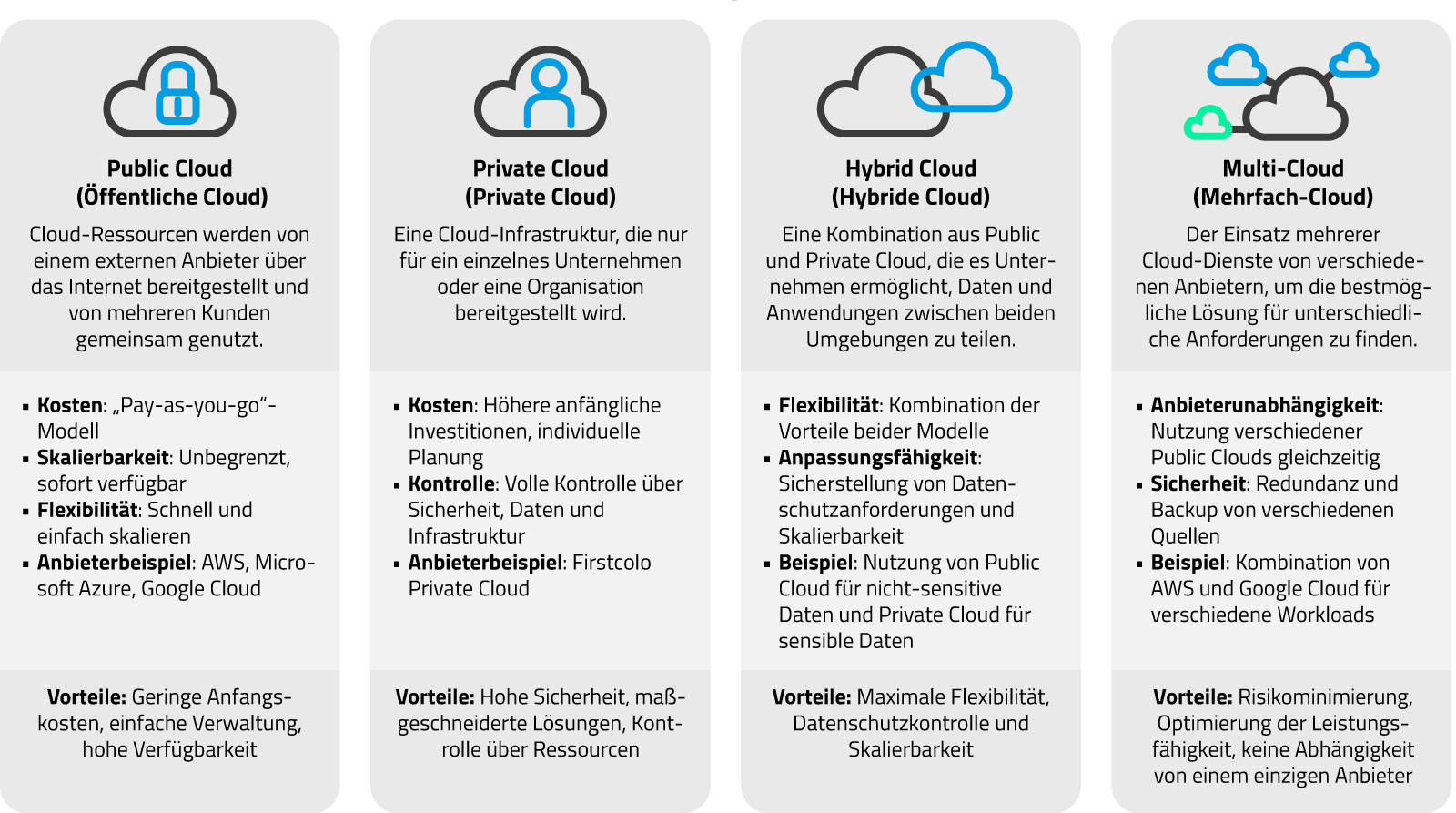Deployment Models of Cloud Computing
Not every cloud is the same, and not every model fits every company. Whether it’s maximum control, highest flexibility, or cost efficiency: Choosing the right cloud deployment model is a key factor for the success of an IT strategy. In this section, we introduce the four basic cloud models and show what matters in the decision-making process.
Cloud Models Overview: Public, Private, Hybrid Multi-Cloud

Public Cloud: Quickly Scalable and Ready for Use
In the public cloud, IT resources such as computing power or storage space are made publicly available over the Internet: usually by large international providers like Amazon (AWS), Microsoft (Azure), or Google. The public cloud is flexible, easily scalable, and follows the “pay as you go” principle – you only pay for what you actually use. This makes it particularly attractive for rapidly growing or project-based applications.
However, companies relying on cloud offerings from US hyperscalers face challenges with data protection here. Data processing can take place outside the EU, creating legal uncertainties (e.g., with regard to GDPR or CLOUD Act).
Suitable for:
Companies with high requirements for security, compliance, or customizability
Private Cloud: Maximum Control and Security
In the private cloud, infrastructure and resources are exclusively reserved for one company, either in their own data center or with a specialized provider like firstcolo. It offers complete data sovereignty, can be individually configured, and meets the highest requirements for security and compliance.
Especially for industries with sensitive data (such as in finance, industry, or healthcare), the private cloud is an important foundation for sovereign IT.
Suitable for:
Companies with high requirements for security, compliance, or customizability
Hybrid Cloud: The Best of Both Worlds

The hybrid cloud combines the flexibility of the public cloud with the control of a private cloud. Companies can, for example, store sensitive data in the private cloud but run compute-intensive applications in the public cloud. This allows for an optimal balance of efficiency, scalability, and security.
A hybrid approach also enables a gradual transition to the cloud. This can be useful when dealing with legacy systems or exceptionally complex IT landscapes.
Suitable for:
Companies with heterogeneous requirements for security and scalability
Multi-Cloud: Flexible, but Complex

In the multi-cloud deployment model, companies deliberately use multiple cloud providers in parallel, for example, for different applications or locations. The goal is to avoid dependencies and combine the best services available in the market. This brings maximum flexibility but also increases complexity in management.
Multi-cloud environments require a well-thought-out governance and security concept.
With firstkube, firstcolo offers a multi-cloud management service that allows k8s clusters to be deployed (also template-based) and centrally managed in different cloud environments.
Suitable for:
Companies with heterogeneous requirements for security and scalability
Decision Criteria: Which Deployment Models of Cloud Computing Fits My Company?
The choice of the suitable model depends, among other things, on:
- Data protection requirements (e.g., GDPR, industry)
- Flexibility needs (e.g., dynamic loads)
- Internal IT expertise (e.g., for operation security)
- Cost structure (CAPEX vs. OPEX)
Tip: In many cases, a coordinated hybrid or multi-cloud approach offers the necessary flexibility without compromising on security and data sovereignty.
firstcolo Offers the Right Deployment Models of Cloud Computing Model with Location Advantage
Public, private, or hybrid cloud solutions, or even custom managed services: firstcolo supports companies in implementing the right Deployment Models of Cloud Computing with its own data centers in Frankfurt am Main, certification according to ISO-27001, ISO-9001, and PCI-DSS, and a focus on data sovereignty.
